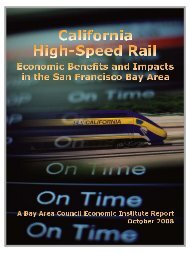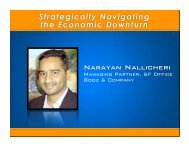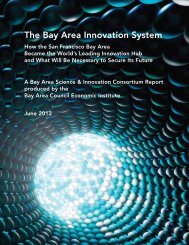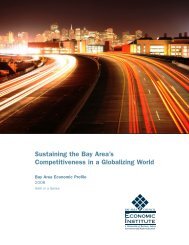Ties That Bind - Bay Area Council Economic Institute
Ties That Bind - Bay Area Council Economic Institute
Ties That Bind - Bay Area Council Economic Institute
Create successful ePaper yourself
Turn your PDF publications into a flip-book with our unique Google optimized e-Paper software.
<strong>Bay</strong> <strong>Area</strong>-China Trade: Behind the Numbers<br />
San Francisco-based Newbridge Capital’s $150 million purchase of an 18% controlling stake in<br />
Shenzhen Development Bank—the first foreign controlling stake in a Chinese institution.<br />
During 2005–06, foreign investments netted another $18 billion for 13 banks. And in October<br />
2006 Morgan Stanley acquired 100% of Nan Tung Bank—a Bank of China subsidiary technically<br />
classified as a “foreign-funded” bank exempt from ownership limits because it is based in Macau,<br />
but which has one commercially licensed Southern China branch in Zhuhai. Nan Tung’s foreign<br />
funded status and existing commercial license allows Morgan Stanley to leapfrog other foreign<br />
competitors and apply immediately to offer a full range of derivatives, foreign exchange and<br />
renminbi-denominated banking products to local and foreign corporate customers in China.<br />
Foreign banks are currently allowed to make loans and take deposits in foreign currencies, and<br />
provide yuan-denominated business services in 25 cities, but the application process is<br />
notoriously slow.<br />
Major change will come in 2007, as China further implements its commitments under the WTO<br />
by allowing foreign banks to offer retail banking services, including consumer loans and the acceptance<br />
of yuan-denominated deposits. As of June 2005, foreign banks had 244 representative<br />
offices and 214 branches in China; assets as of April 2005 totaled more than $76 billion.<br />
With foreign competition looming, Chinese banks aren’t sitting still. In addition to governmentinitiated<br />
share sales to strategic investors, major banks—and even some second-tier institutions—are<br />
raising unprecedented funds through public share offerings. This includes three of<br />
China’s “Big Four” which have individually raised capital in the range of $10–15 billion, and together<br />
now have a market capitalization of over $110 billion—placing them in the world’s top<br />
ten. CCB raised $9.2 billion in an initial 2005 listing on the Hong Kong Exchange. A June 2006<br />
IPO, the world’s largest since 2000—plus an additional share allotment—raised $11.1 billion for<br />
the Bank of China. An ICBC simultaneous listing on the Hong Kong and Shanghai exchanges in<br />
October 2006 was the largest IPO ever, raising in excess of $19 billion. In addition to capital,<br />
foreign investment is bringing new skills—such as retail risk management—to China’s<br />
financial system.<br />
All of this activity positions Chinese and foreign-owned banks for aggressive competition in a<br />
growing retail market segment. Consumer credit, introduced in 1997, has only recently helped<br />
diversify lending. Mortgages, car and school loans and consumer credit last year accounted for<br />
26% of new lending. Still, outside of joint ventures with foreign partners, banks offer few feegenerating<br />
savings and insurance products. China had only about 12 million credit card customers<br />
last year, almost all paid their bills in full each month, and banks have resorted to poaching<br />
each others’ customers with increasingly costly giveaways.<br />
%D\ $UHD &RQQH�WLRQV<br />
Foreign-owned banks, private equity partnerships and venture firms have stepped in to fill the<br />
financial services gap—in trade finance and private banking services; in strategic equity investments;<br />
and in mergers and acquisitions (M&A) and venture funding, to help companies of all<br />
sizes achieve scale and global reach.<br />
59








